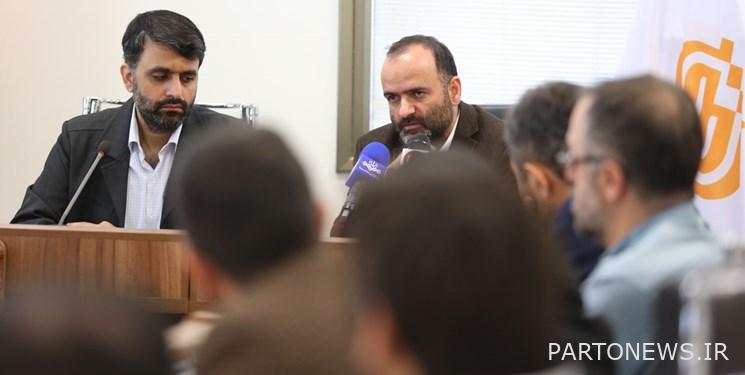Naqoyan: I saw many gaps in the narrative of the history of the revolution

According to Fars news agency, the unveiling ceremony of the documentary series “This is not an embassy” was attended by Mehdi Heshmatimenesh, the producer and Mehdi Naqoyan, the director of the film, Sadegh Yazdani, director of the Ofoq network, Mohammad Hassan Qadiri Abyaneh, the former ambassador of our country to Italy, Ammar Attapour, the head of the Basij Center for Cultural and Artistic Creations. Jalal Ghaffari, the secretary of the International Resistance Film Festival and a group of media people, was held on the Efoq network.
Political activist Mohammad Hassan Qadiri Abyaneh, who was present at this meeting, was chosen by pointing out that it is true that the name of the document is not an embassy, but actually before the revolution, there was no embassy and it was a base for the government of Iran. The documents found in this embassy are completely confidential and secret, and I wish these documents would somehow reach the universities of the world.
Qadiri Abyaneh stated that the leadership emphasized that these documents should be published even in textbooks, adding: Making these documentaries helps to express the facts of how America rules in other countries. Of course, some of these documents were completely faked by Americans to push countries to achieve their own goals.
*Islamic revolution and sacred defense are valuable treasures
Sadegh Yazdani, Director of Afog Network, stated at the beginning of this meeting that November 13th in the history of our country is reminiscent of three important events: the exile of the Imam to Turkey, the killing of students by the Pahlavi regime, and the capture of the spy den, and said: “Telling the facts and unsaid events of the Islamic Revolution from The main missions of the Efogh network and the production of documentaries in these years have been focused on this mission.
Expressing the important features of this 7-part documentary series, Yazdani said: Interviews with the hostages, airing of archival images that will be aired for the first time, and an interesting and different narrative and the expression of some hidden angles of the 13th of Aban affair are prominent features of this work.
Referring to the other productions of the Efoq network, he emphasized: Of such documentaries, the Efoq network is producing other cases in which we try to tell other important aspects of the Islamic Revolution. The issue of the Islamic revolution and the sacred defense of precious treasures and mines is one that should be tried to find the rare diamonds of this field by slow and digging in this mine.
The manager of Ofogh Network, mentioning that all our efforts are to make this documentary series appear on the broadcast schedule soon, said: With the interaction that has taken place, this documentary is supposed to be broadcast on other channels as well.
Mohammad Hashmati Menesh, the producer of this documentary series, also said about the research of this work: We tried to express this story with more than 30 English and Farsi books and 1200 pages of extensive library research, images and news of western and domestic narratives.
The producer of this documentary stated that the name of this work was taken from the Imam’s famous speech and said: Imam Khomeini (RA) said after capturing the embassy: This was not an embassy, but a spy nest.
At the end of the program, Mehdi Naqoyan, the director of this 7-episode series, expressed his gratitude to the managers of the Afogh Network, who have provided this pure archival access to this production team with various collaborations and consultations, and said: during ten years of documenting many gaps. I observed in the narrative of the history of the revolution and tried to always make documentaries that are a clearer narrative for the new generation.
He added: “Usually, many good works are made in radio and television during different decades, but there is no advertisement for them and it has not even had a proper rebroadcast, but we are happy that this path is being corrected.”
* The clear narrative of history prevents distortions
Jalal Ghaffari, CEO of the Institute of Narrative Thought and Art, continued to consider the importance of the statement of the second step of the leadership for the strategy of the media in the second 40 years of the rule, and said: There are two important principles in this statement, which can be considered as the serious mission of the media; First, the past should be properly known, otherwise lies will replace the truth, and the clear and accurate narration of history can prevent these historical distortions.
In this statement, Ghaffari called the hope-giving movement the mission of other media and added: One of the important features of the Afogh network is that it has included these historical correct narratives in its agenda. My suggestion is to update and broadcast this work again at other times in future broadcasts by editing and completing the narratives.
end of message/
You can edit this article
Suggest this article for the first page

